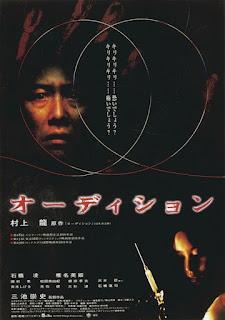Audition (1999)
Audition has a plot that could only happen in a Japanese movie. No matter how sympathetic the main male character is I cannot see, even in 1999, a situation where Hollywood would greenlight a movie where a man uses a fake movie audition in order to try to find a new wife. It does sound like something from a Lifetime or Hallmark movie, but it also sounds like something that would also lead to the revelation that our "hero" had a secret past and that the heroine was in grave danger.
For a good part of its time director Takashi Miike makes Audition feel like it's a romantic drama. Based on a book by Ryû Murukama, who supposedly had tried something similar to find a woman, this entire idea of finding a date backfires. Only, it is not our protagonist that has the dark side.
Shigeharu Aoyama (Ryo Ishibashi) is the owner of a small film company. When his wife Ryoko (Miyuki Matsuda) passes away he is left to raise their son Shigehiko (Tetsu Sawaki) on his own. Seven years later, at the urging of his son, he begins to consider remarrying. Concerned with finding the right woman, and the time involved in doing so, he confides in his best friend Yoshikawa (Jun Kunimura), who comes up with the idea of doing an audition. The film is real to avoid any nuance of fraud, but the point is to see if any of the women who try out for the lead would be suitable.
Aoyama happens to find one in Asami Yamazaki (Eihi Shiina), a young girl with previous ballet experience. He calls her after the audition and, after a date, they hit it off. Yoshikawa, looking out for his friend, is concerned because most of the details she gave don't seem to match and it is difficult to find any information on her. Aoyama, already head over heels for Asami, ignores this, and at first things seem perfect. When she disappears after the first time they make love he goes in search for her, finding that her past is darker than she let on. Even worse, her need for complete and total love has put Aoyama in grave danger.
I have often said that the perfect place to put the most violent content is at the end of a movie, or at least to reserve it for one sequence. There may be other hints, or small things that happen, but constant violence in a movie becomes numbing. That is why it is used for entertainment or humor purposes in many horror films, since it is both unrealistic and over the top. To be truly effective it has to be memorable, has to come all at once and be as realistic as possible. Miike, and his writer Daisuke Tengan, designed the movie for just this impact. From what I understand it is quite different from Murukama's book, but it works well. It gets quite surreal toward the end, leaving some question as to what parts were real and what parts are Aoyama having a drug-induced hallucination, but Miike has said that the most violent parts are not supposed to be nightmares or manifestations of guilt. They are reality.
There are hints throughout the film, with Asami living in a run-down flat with a man in a bag (Ren Ôsugi), supposedly one of her former lovers. This was only Eihi Shiina's second film, and her soft, almost withdrawn performance matches her ghostly appearance. It helps keep things off-kilter while the majority of the story seems quite normal. Ryo Ishibashi also does a fine job of portraying Aoyama's loneliness, while the number of static shots Miike does at the beginning makes him feel even more isolated.
It is a well-crafted movie and a perfect example of how to make uncomfortable scenes effective, how to properly pace a film and how to let the camera tell a story. The surrealistic touches may muddy things a bit, but the movie is what it is presented to be. It's left up to the audience to decide on a few points, including whether Aoyami deserves his treatment at the hands of Asami, but what most people will take from it is the suffering he endures - something that Miike has the audience endure with him.
Audition (1999)
Time: 115 minutes
Starring: Ryo Ishibashi, Eihi Shiina, Tetsu Sawaki, Jun Kunimura
Director: Takashi Miike




Comments
Post a Comment